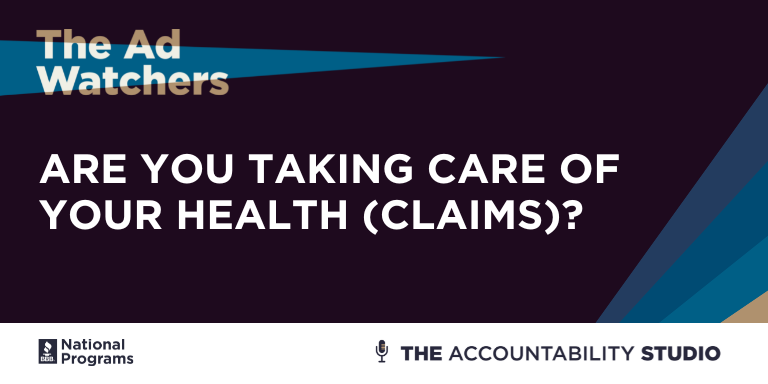
In the first episode of season 3 of Ad Watchers, Annie Ugurlayan, the Assistant Director at the National Advertising Division (NAD), is joined by new host Dan Range, an attorney at NAD, to dive into the recently updated health product compliance guidance from the Federal Trade Commission (FTC). They touch upon the changes in the updated guidance and provide additional resources for those interested in deepening their understanding of claim substantiation for health-related claims.
01:44 – Annie explains that before this newly updated advertising guide, the FTC’s standards were detailed in a document called “Dietary Supplements: An Advertising Guide for Industry.” This guide was published in 1998 in response to a significant increase in the number of dietary supplement products and the uses for which they were promoted. The FTC aimed to answer questions about how policies and enforcement practices related to the new products, particularly in light of the 1994 Dietary Supplements Health and Education Act, which changed the Food and Drug Administration’s (FDA’s) involvement in regulating supplement labeling.
02:46 – On December 20, 2022, the FTC released the Health Products Compliance Guidance, replacing the 1998 document. Unlike its predecessor, the new guidance applies to all health-related claims, not just those relating to dietary supplements. This updated document incorporates FTC cases and product innovations from the past 20 years. It provides numerous examples to clarify the level and type of evidence required to substantiate health-related claims. Although much of the guidance remains the same, this update highlights important changes and reiterates significant issues. It serves as a reminder of the FTC’s ongoing monitoring of advertising for health-related products.
03:34 – Annie wrote a blog diving into the differences and similarities between the two documents. She explains that—despite the expansion of purview—the heart of the document remains the same. Health claims must be well substantiated with scientific evidence, and the substantiation must be relevant to the specific product. She closes the article with some helpful tips for advertisers: be sure to be laser-focused on the quality of evidence and always scrutinize third-party sources as much as possible. Advertisers are ultimately responsible for anything they say about their product, so the best practice is to go to the furthest lengths possible to ensure the truthfulness and accuracy of each claim.
17:02 – When warning advertisers against mischaracterizing health claims, Annie cites Example 48 in The Health Products Compliance Guide, which states, “Advertisers should be careful not to mischaracterize the extent to which a product or claim has been reviewed, authorized, or approved by the FDA.” The example given is a product advertised as “Meeting a FDA Qualified Health Claim.” This is not a widely used term that consumers will recognize or understand. In fact, they may misconstrue the phrasing as one that communicates FDA approval or promotion. It’s not untrue, but it’s misleading nonetheless. Despite the lack of falsities, health claims can still be deceptive to consumers who don’t possess all the necessary information. The burden lies on advertisers to avoid mischaracterization. To do so, they must understand the context in which their audience will be viewing an advertisement and communicate transparently through that lens.
22:53 – To advertise responsibly, marketers must be vigilant. They must understand the science behind their health claims and stay aware of new tests with new results. They must be careful about the claims they make and the reviews they publish. Americans spend billions of dollars annually on food and supplements that they hope will improve their wellness. Advertisers have a responsibility to provide consumers with as much transparency as possible to help them make informed decisions about their well-being. The FTC provides blogs and other resources to help advertisers understand this responsibility. Read the FTC’s Health Products Compliance Guidance and supplemental resources, scrutinize every promotion about your product, and do your part to help consumers take care of their health.
Visit to Learn More: NAD FAQs
Contact Information: programs@bbbnp.org
Listen to the full episode here.

